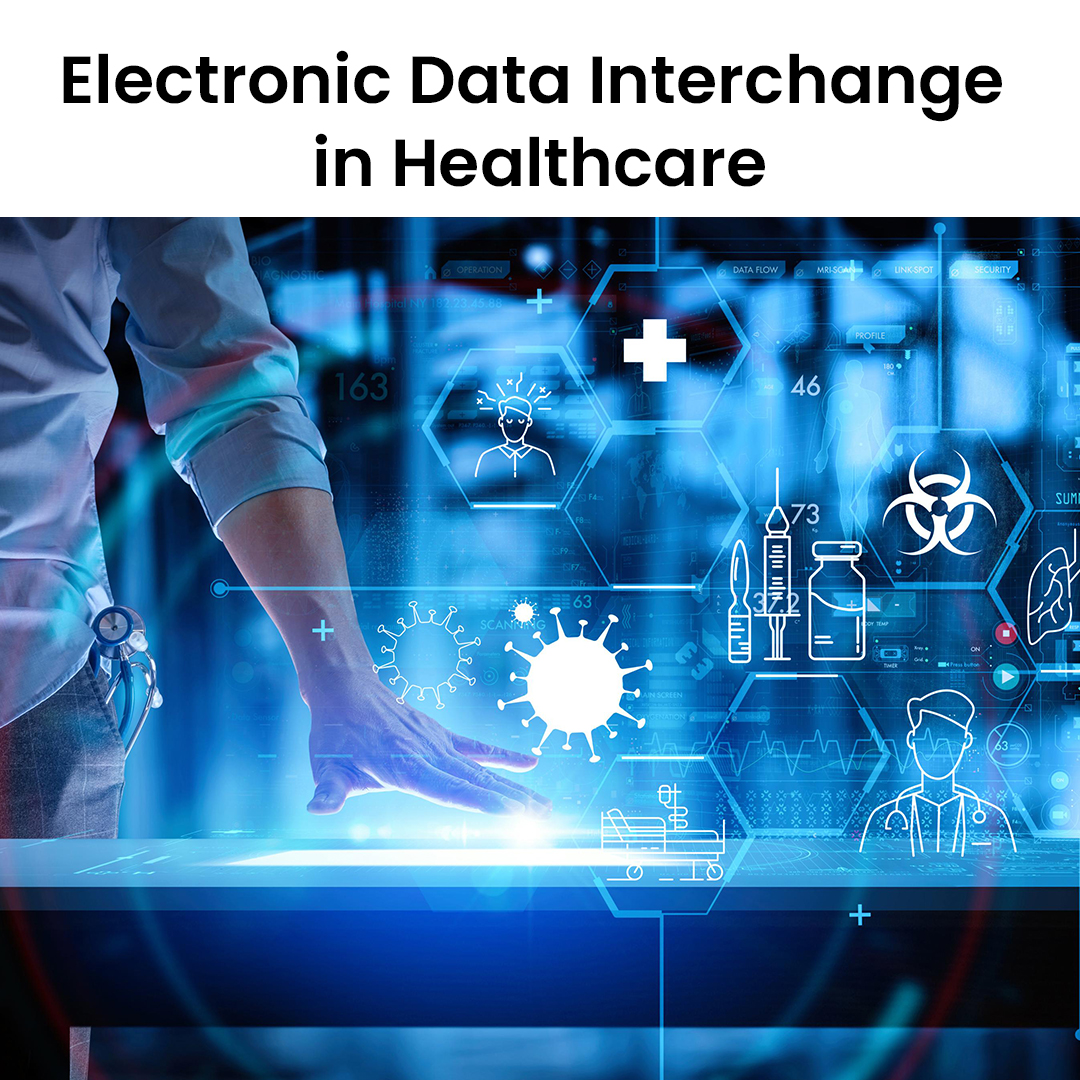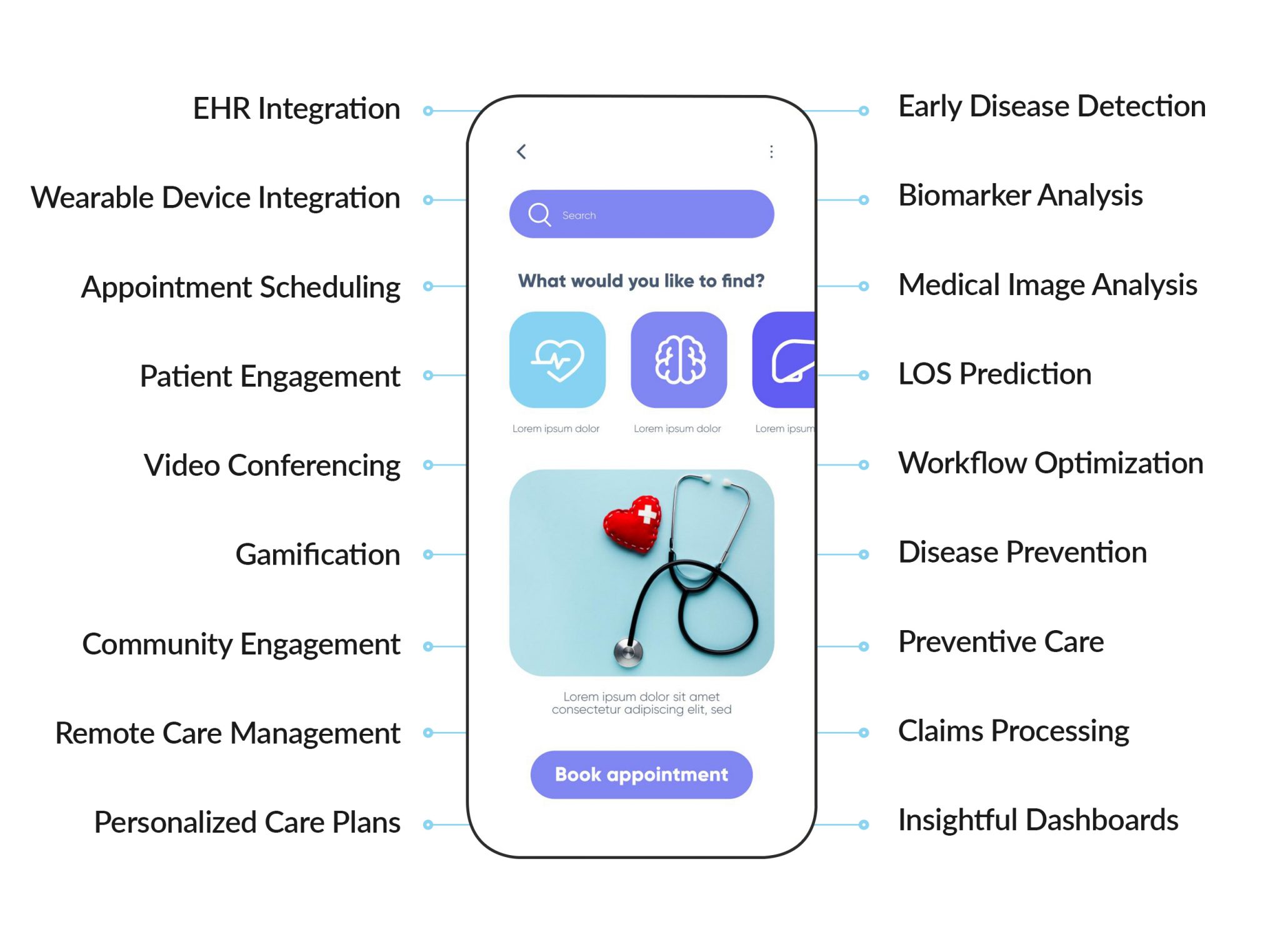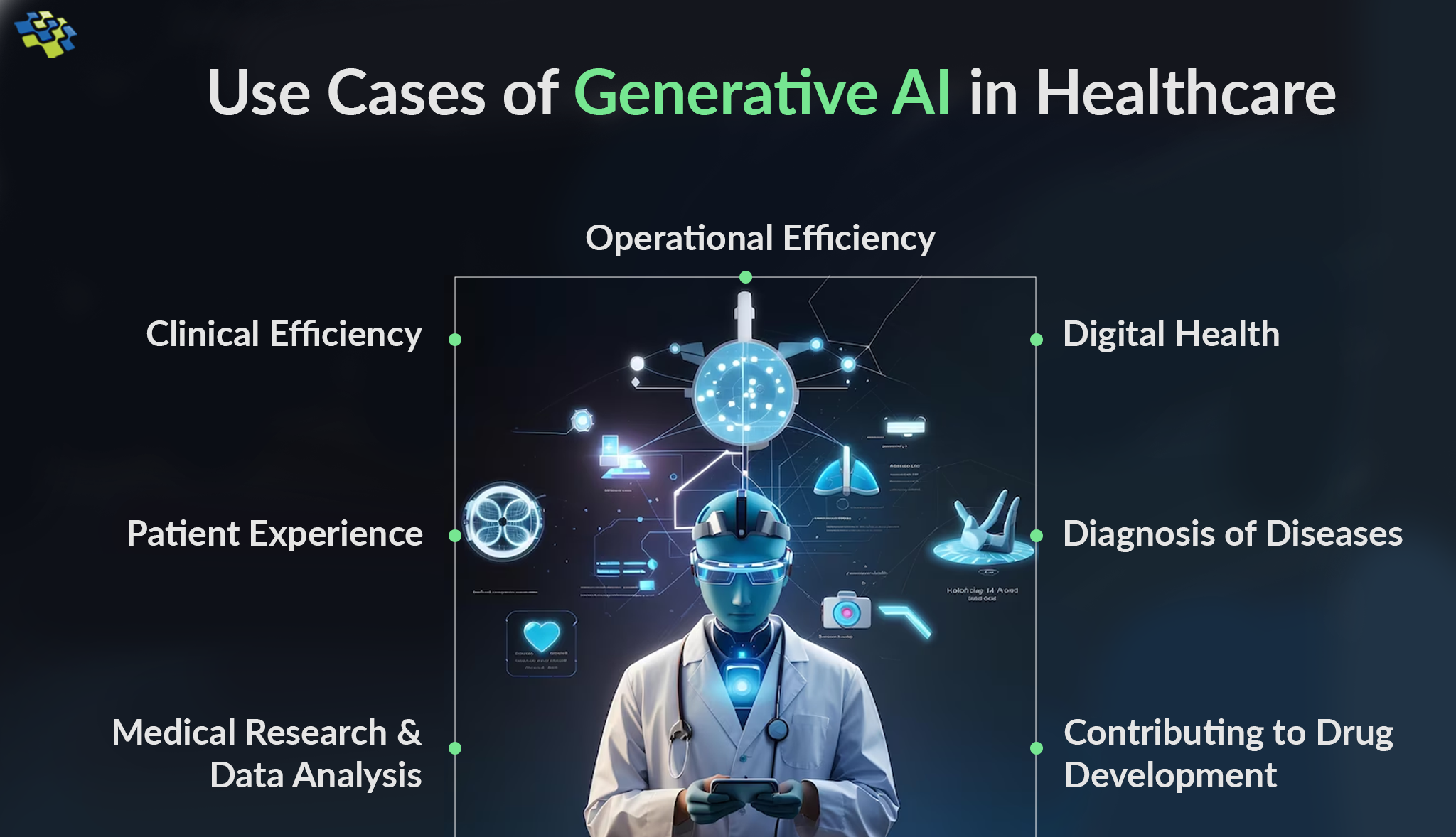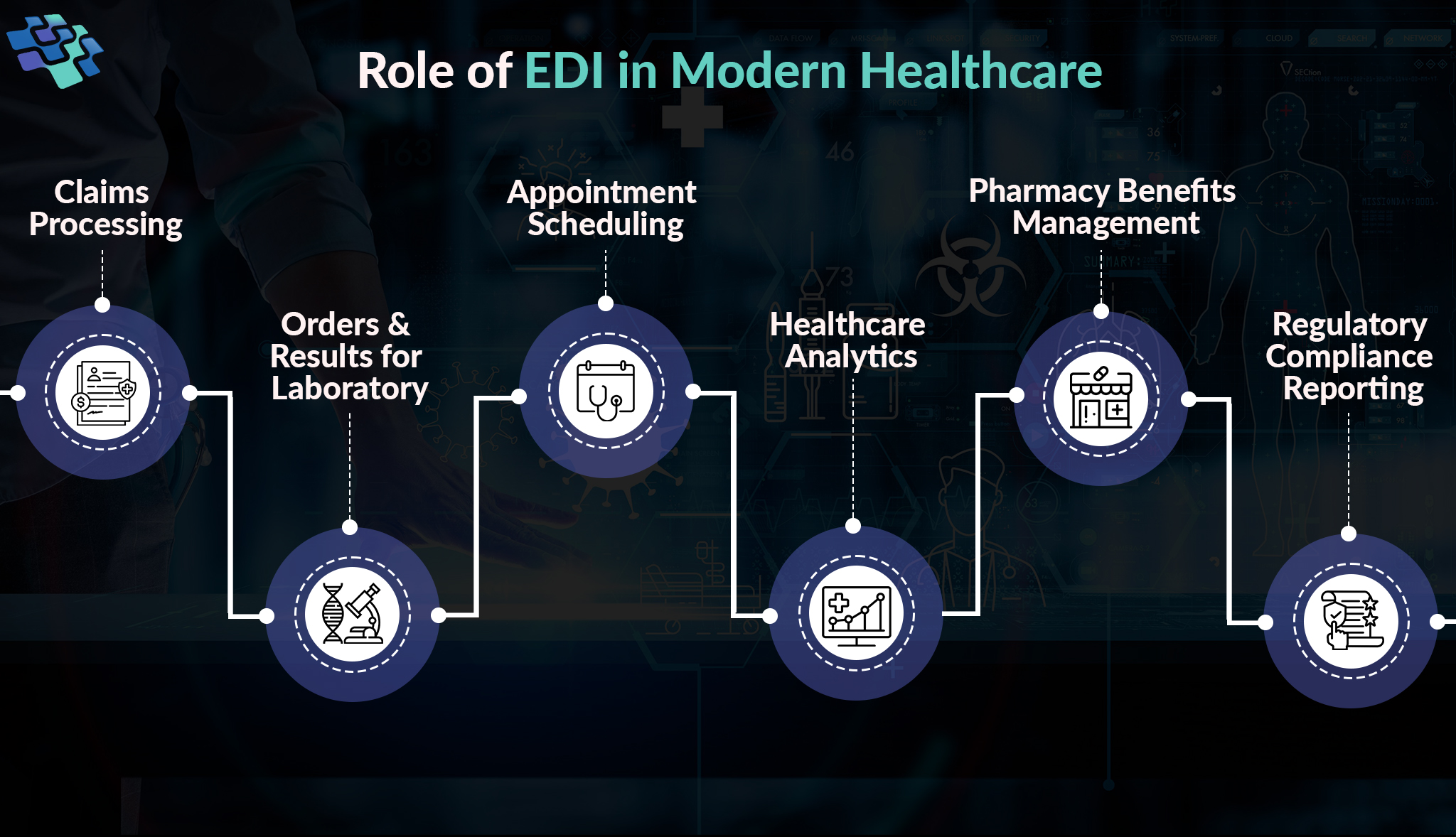Exploring the Role of EDI in Healthcare
With standardized formats, Electronic Data Interchange ensures seamless communication across systems, improving data security. This automation enhances data security, quality, and accuracy, improving patient care and operational efficiency across the board.

Resolve Data Security and Communication Issues with Our EDI Solutions for Streamlined Healthcare Operations

“In the United States, managing unstructured data and content was the biggest obstacle to improving interoperability and providing a greater connected care experience in healthcare. According to the survey results, almost 50% of respondents in hospitals and health systems reported this to be an obstacle.”– Statista
What Does EDI Stand for in Healthcare?
EDI in healthcare automates the exchange of structured data between computer systems, playing a pivotal role in healthcare operations. Despite 88% of hospitals engaging in health data exchange, challenges persist due to diverse information systems and a lack of data standards. Electronic Data Interchange resolves this by establishing uniform language and structure for data transmission, ensuring consistency and compatibility across systems. With pre-defined message formats, it securely communicates data among healthcare organizations, insurers, and patients.
To leverage Electronic Data Interchange effectively, healthcare providers can collaborate with digital healthcare supply chain management software companies to create tailored solutions. This fosters efficient information exchange and operational efficacy, benefiting patient care and organizational efficiency in the healthcare sector.
EDI in Healthcare: How Does It Work?
Electronic data interchange in healthcare involves the electronic exchange of healthcare data between computer systems, distinct from email exchanges.
- Various methods like web-based EDI, point-to-point EDI, and mobile EDI facilitate EDI transaction delivery.
- Compliance with ANSI standards and HIPAA laws is essential for healthcare providers employing EDI. ASC X12 developed standard EDI formats, ensuring uniformity in transactions.
Adherence to these standards enhances standardization, reduces costs, ensures security, and boosts productivity for healthcare providers and organizations. Moreover, using standardized methods improves the reliability of specialized healthcare data storage software. Electronic Data Interchange transactions play a crucial role in streamlining data exchange in the healthcare sector, contributing to efficiency and compliance with regulatory requirements.
Benefits of EDI in Healthcare
The healthcare sector can benefit greatly from EDI in several ways. It makes information sharing between patients, insurers, healthcare providers, and other stakeholders more effective and secure.
- Reducing the Administrative Burden: Being efficient, Healthcare Electronic Data Interchange systems are also cost-effective. Better patient care outcomes, cost reductions, and time optimization result from integrating EDI into your enterprise resource planning system. It’s about improving healthcare operations, not just cutting back on administrative responsibilities.
- Data Exchange & Streamlining Communication: Medical transactions are made more reliable and efficient by EDI in healthcare, which replaces laborious human paperwork and removes the possibility of errors or missing data. Automation helps with healthcare education as well, making payer collaboration easier. Providers can discuss healthcare claim statuses, get more information, and settle disputes more rapidly when there is streamlined communication.
- Enhancing Patient Care & Outcomes: Through the facilitation of smooth communication between providers, patients, and other system participants, EDI ensures accurate and timely data transmission. The accuracy of EDI transactions contributes to a more trustworthy method of communicating health-related information while saving time on chores linked to filing claims and adjudication. Quick information transfers to several parties maximize performance results and lower rejection rates, which lowers the requirement for rework.
Role of EDI in Modern Healthcare
The EDI in healthcare has revolutionized the industry by making it possible for a safer, more efficient interchange of healthcare data. Other countries have done the same; in the case of the United States, rules such as HIPAA have forced its deployment in the healthcare industry. To further grasp the growing importance of Electronic Data Interchange healthcare, let’s look at the incredible advancements this technology has brought about in the healthcare industry.
1. Claims Processing
EDI in healthcare plays a crucial role by facilitating the electronic submission of standardized insurance claims from healthcare practitioners to insurance carriers. This process streamlines claims management, as it eliminates the need for manual paperwork and speeds up the reimbursement cycle.
- Healthcare organizations benefit from improved cash flow and faster reimbursement, which ultimately enhances their financial health.
- EDI reduces the administrative burden associated with claim processing, saving time and resources for healthcare providers.
- By automating the review and response process, Electronic Data Interchange also ensures accuracy and consistency in claim submissions, minimizing errors and rework.
Electronic Data Interchange healthcare claims management significantly improves operational efficiency and financial outcomes for both healthcare organizations and insurance carriers.
2. Orders & Results for Laboratory
In laboratory settings, EDI services revolutionize experiment ordering and reporting by automating the process. Upon receiving electronic orders from healthcare providers, labs swiftly generate and deliver results, reducing errors and expediting operations. Implementing Electronic Data Interchange in laboratories can increase operational efficiency by up to 60%. This integration ensures seamless integration of results into patients’ EHR, mitigating risks associated with manual data entry errors.
By minimizing paperwork and accelerating processes, EDI services optimize laboratory workflows, enhancing the quality and accessibility of patient care.
3. Appointment Scheduling
Healthcare providers leverage EDI to streamline the exchange of appointment schedules with patients, referring physicians, and other healthcare facilities. This electronic exchange expedites scheduling processes, reduces administrative burdens, and ultimately elevates patient satisfaction levels.
- Through Electronic Data Interchange, appointment schedules can be seamlessly shared and updated across multiple entities, ensuring accuracy and timeliness.
- EDI in healthcare enables providers to efficiently manage their appointment calendars, allocate resources effectively, and minimize scheduling errors.
- Patients benefit from receiving prompt notifications and reminders about their appointments, leading to improved attendance rates and overall patient engagement.
EDI facilitates seamless collaboration between healthcare providers and referring physicians, enabling them to coordinate care more effectively and enhance patient outcomes.
4. Healthcare Analytics
Healthcare systems utilize Electronic Data Interchange to exchange standardized data formats, empowering them to harness healthcare analytics for population health management and performance measurement. Leveraging EDI, healthcare organizations can make informed decisions to enhance patient care delivery and optimize resource allocation. This streamlined data exchange process ensures that relevant information is readily available for analysis, enabling healthcare providers to identify trends, monitor performance metrics, and drive continuous improvement initiatives.
EDI-driven healthcare analytics enable organizations to effectively manage population health, measure performance outcomes, and drive strategic decision-making to improve overall healthcare delivery.
5. Pharmacy Benefits Management
Pharmacies, healthcare providers, and pharmacy benefit managers use Electronic Data Interchange to process prescription orders, verify patient eligibility, confirm drug formularies, and receive payment data electronically. This enhances the efficiency of prescription fulfillment and minimizes medication errors.
Employing EDI in healthcare, these entities streamline the entire prescription management process, from order placement to payment reconciliation. This electronic approach eliminates the need for manual intervention, reducing the likelihood of errors and delays associated with traditional paper-based methods.
6. Regulatory Compliance Reporting
Electronic Data Interchange in health care enables healthcare organizations to electronically submit regulatory compliance reports, including HIPAA-mandated transactions, quality reporting measures, and public health surveillance data. This ensures timely and accurate reporting, reducing the administrative burden on healthcare organizations. With EDI, these reports can be efficiently transmitted, processed, and documented, without the need for manual intervention. This electronic approach not only enhances the speed of reporting but also improves data accuracy and compliance with regulatory requirements.
Electronic Data Interchange healthcare also streamlines communication between healthcare entities and regulatory agencies, facilitating seamless information exchange.
Refer to Our Podcast for Further Details:
Strategies for Advancing Precision Medicine Accessibility & Adoption
Customized EDI Software Solutions from NextGen Invent
Medical software architecture and HIPAA EDI standards skills are necessary when selecting or creating a healthcare EDI software solution that can meet all the demands and specifications of contemporary healthcare. A trustworthy partner, NextGen Invent, can assist you in developing a unique healthcare EDI software solution that complies with HIPAA regulations. In addition, we can think about re-engineering different kinds of legacy systems or implementing EDI support for your current software system.
- We specialize in developing full-stack medical software systems supporting EDI communications.
- Our LIMS optimizes lab procedures, automation, multi-equipment uses, and reporting.
- Our expertise includes pharmacy inventory and delivery management platforms, facilitating medication delivery, documentation, and integration with shipping providers.
- We excel in physician and nurse appointment scheduling software development, enabling scheduling, tracking, and management of medical personnel, medication plans, and appointments.
- Our EDI solutions for healthcare suppliers include medical inventory management, tracking, and integration with billing solutions.
Why Develop Custom EDI Healthtech Solutions with NextGen Invent?
NextGen Invent offers custom EDI software for healthcare solutions tailored to the specific needs of healthcare providers, whether small clinics or large healthcare systems. Our solutions prioritize safety, security, and HIPAA compliance to safeguard patient data. By implementing our solutions, you can reduce costs, minimize paperwork, and enhance accuracy and efficiency in healthcare management. We ensure your organization meets current demands for access, privacy, speed, and compliance.
Contact us today for a consultation and take the first step towards streamlining your healthcare operations.
Related Blogs

7 Most Crucial Use Cases of Generative AI in Healthcare
From personalized treatment strategies to drug discovery and medical imaging enhancement, Generative AI development services optimize decision-making and accelerate research. Its adaptive algorithms generate synthetic data, aiding in training models with limited datasets, crucial for rare diseases.

Computer Vision in Healthcare: Transformation is Here
Within healthcare, the efforts of medical professionals play a pivotal role and have a direct impact on patients’ well-being. Advanced computer vision in healthcare technologies, particularly in object recognition, empowers physicians with an unmatched ability to focus and keenly observe critical details.

How is AI Changing the Future of Precision Medicine?
In the future of precision medicine, the fundamental practice of gathering patient information remains pivotal. However, a transformative wave powered by digital health and disruptive technologies, including wearable sensors and artificial intelligence, is reshaping healthcare.
Stay In the Know
Get Latest updates and industry insights every month.

